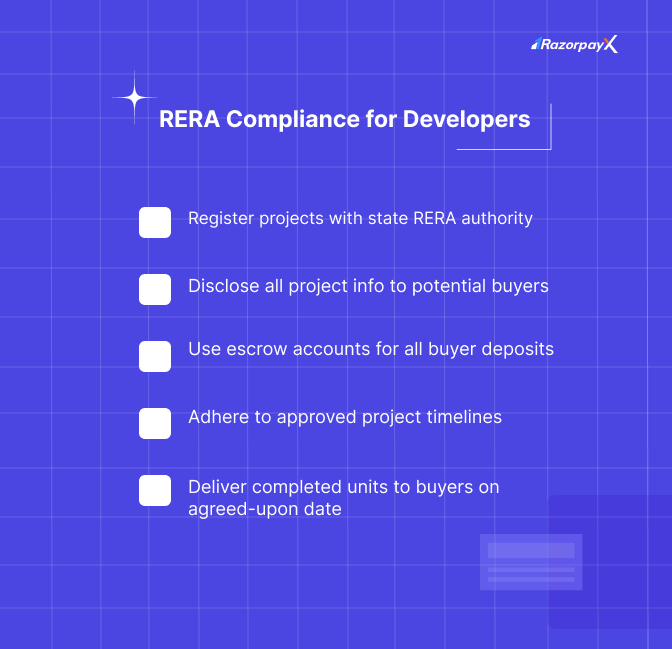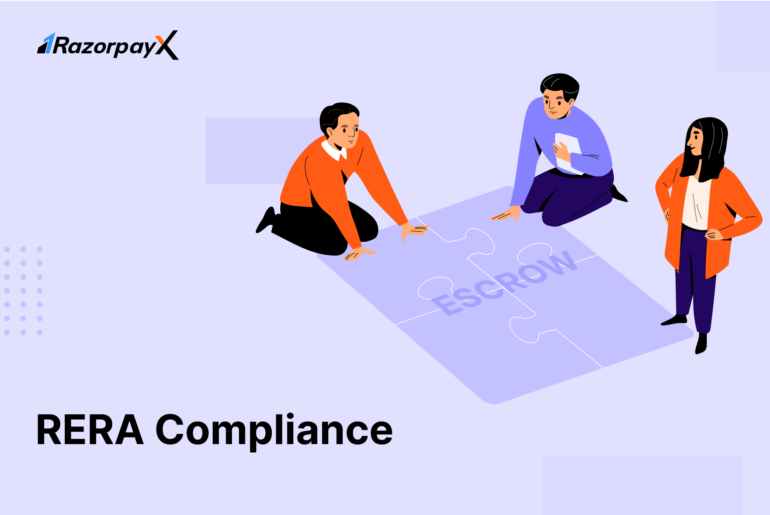Table of Contents
What is RERA?
RERA compliance is an important part of real estate transactions. But what is it, and how do real estate developers and buyers ensure RERA compliance?
The Real Estate (Regulation and Development) Act, 2016 (RERA) is a landmark legislation enacted to regulate the real estate sector in India. It aims to protect the interests of homebuyers and promote transparency and accountability in the sector.
RERA mandates developers to register their projects with the respective state RERA authority before launching or advertising them. It also requires developers to disclose all relevant project information to potential buyers, including the project timeline, amenities, and payment schedule.
Why is RERA Compliance Important?
RERA compliance is important for both developers and buyers. For developers, RERA compliance helps to build trust and credibility with potential buyers. It also helps to avoid delays and disputes in project execution.
For buyers, RERA compliance ensures that they are investing in a project that is backed by a credible developer and that is likely to be completed on time and within budget. RERA also provides buyers with a forum for redressal if they have any grievances against the developer.
Key RERA Compliance Requirements for Developers
- Project registration: Developers must register their projects with the respective state RERA authority before launching or advertising them.
- Disclosure of project information: Developers must disclose all relevant project information to potential buyers, including the project timeline, amenities, and payment schedule.
- Use of escrow accounts: Developers must deposit all buyer payments into escrow accounts. This ensures that the funds are used for the intended purpose and are not diverted to other projects.
- Adherence to project timeline: Developers must adhere to the project timeline as approved by the RERA authority. If there are any delays, the developer must provide a valid reason and compensate the buyers accordingly.
- Delivery of completed units: Developers must deliver the completed units to buyers on the agreed-upon date. If there are any delays, the developer must provide a valid reason and compensate the buyers accordingly.
Fully-Compliant RERA Escrow Account
Benefits of RERA Compliance
For Developers
RERA compliance helps developers build trust and credibility with potential buyers, which can lead to increased sales and higher profits. It also helps to reduce disputes between developers and buyers, saving developers time and money.
Additionally, RERA compliance helps developers improve their project execution by requiring them to have a clear plan in place for the project and to stick to the approved timeline and budget.
In short, RERA compliance is beneficial for developers in a number of ways, including:
- Increased sales and profits
- Reduced disputes
- Improved project execution
- Enhanced credibility and trust with buyers
By complying with RERA, developers can create a more transparent and accountable real estate sector, which benefits all stakeholders involved.
Benefits of RERA Compliance
For Buyers
RERA compliance protects the interests of buyers in a number of ways. For example, RERA requires developers to disclose all relevant project information to buyers and to deposit all buyer payments into escrow accounts. This ensures that buyers are well-informed about the project they are investing in and that their funds are safe and secure.
RERA compliance also helps to ensure that projects are completed on time and within budget. This is because RERA requires developers to adhere to the approved project timeline and to compensate buyers for any delays. This gives buyers peace of mind, knowing that they will receive their completed unit as scheduled.
Finally, RERA provides buyers with a forum for redressal if they have any grievances against the developer. This can help buyers to resolve their disputes quickly and efficiently. For example, if a buyer is not satisfied with the quality of construction or if the developer delays the project, they can file a complaint with the RERA authority. The RERA authority will then investigate the complaint and take appropriate action against the developer.
How to Ensure RERA Compliance
Developers can ensure RERA compliance by following the following steps:
 Buyers can ensure RERA compliance by:
Buyers can ensure RERA compliance by:
- Verifying that the project is registered with the respective state RERA authority.
- Carefully reviewing the project information provided by the developer before making a purchase decision.
- Making all payments to the developer’s escrow account.
- Keeping track of the project timeline and raising any concerns with the developer in a timely manner.
- Filing a complaint with the RERA authority if they have any grievances against the developer.
RERA Compliance and Escrow Accounts
One of the key RERA compliance requirements for developers is to use escrow accounts to deposit all buyer payments. An escrow account is a third-party account that holds funds until certain conditions are met. In the case of a real estate transaction, the escrow account will hold the buyer’s funds until the developer delivers the completed unit to the buyer.
Using escrow accounts provides a number of benefits for both developers and buyers:
Benefits for Developers:
- Enhanced credibility and trust: Using escrow accounts shows buyers that the developer is committed to transparency and accountability. This can help to enhance the developer’s credibility and trust with potential buyers.
- Reduced risk of financial disputes: Escrow accounts help to reduce the risk of financial disputes between developers and buyers. This is because the buyer’s funds are held in a neutral account until the developer delivers the completed unit.
- Improved cash flow management: Escrow accounts can help developers to improve their cash flow management. This is because the developer can access the buyer’s funds gradually as they complete different milestones in the project.
Benefits for Buyers:
- Financial protection: Escrow accounts protect the buyer’s funds from being misused or diverted by the developer. This is because the escrow agent will only release the funds to the developer once the buyer has received the completed unit.
- Peace of mind: Escrow accounts give buyers peace of mind knowing that their funds are safe and secure until they receive the completed unit.
- Transparency and accountability: Escrow accounts promote transparency and accountability in the real estate sector. This is because the escrow agent is responsible for tracking the flow of funds and ensuring that all parties to the transaction comply with their obligations.
FAQs
What happens if a developer does not comply with RERA?
Developers who do not comply with RERA may be subject to a number of penalties, including fines, imprisonment, or a combination of both. The RERA authority may also direct the developer to rectify any violations or to compensate buyers for any losses they have incurred.
What should I do if I am a buyer and my developer is not complying with RERA?
If you are a buyer and your developer is not complying with RERA, you can file a complaint with the RERA authority. The RERA authority will investigate your complaint and take appropriate action against the developer.
What are some tips for ensuring RERA compliance?
Here are some tips for ensuring RERA compliance: For developers: Register your projects with the respective state RERA authority before launching or advertising them. Disclose all relevant project information to potential buyers, including the project timeline, amenities, and payment schedule. Use escrow accounts to deposit all buyer payments. Adhere to the project timeline as approved by the RERA authority. Deliver the completed units to buyers on the agreed-upon date. For buyers: Verify that the project is registered with the respective state RERA authority. Carefully review the project information provided by the developer before making a purchase decision. Make all payments to the developer's escrow account. Keep track of the project timeline and raise any concerns with the developer in a timely manner. File a complaint with the RERA authority if you have any grievances against the developer.





